An Urgent Call for Humanity in the Age of Trump
Alexandria Bombach discusses her documentary, "On Her Shoulders," the Yazidi people, and the challenges of telling the story of Nobel Peace Prize co-winner Nadia Murad (pictured).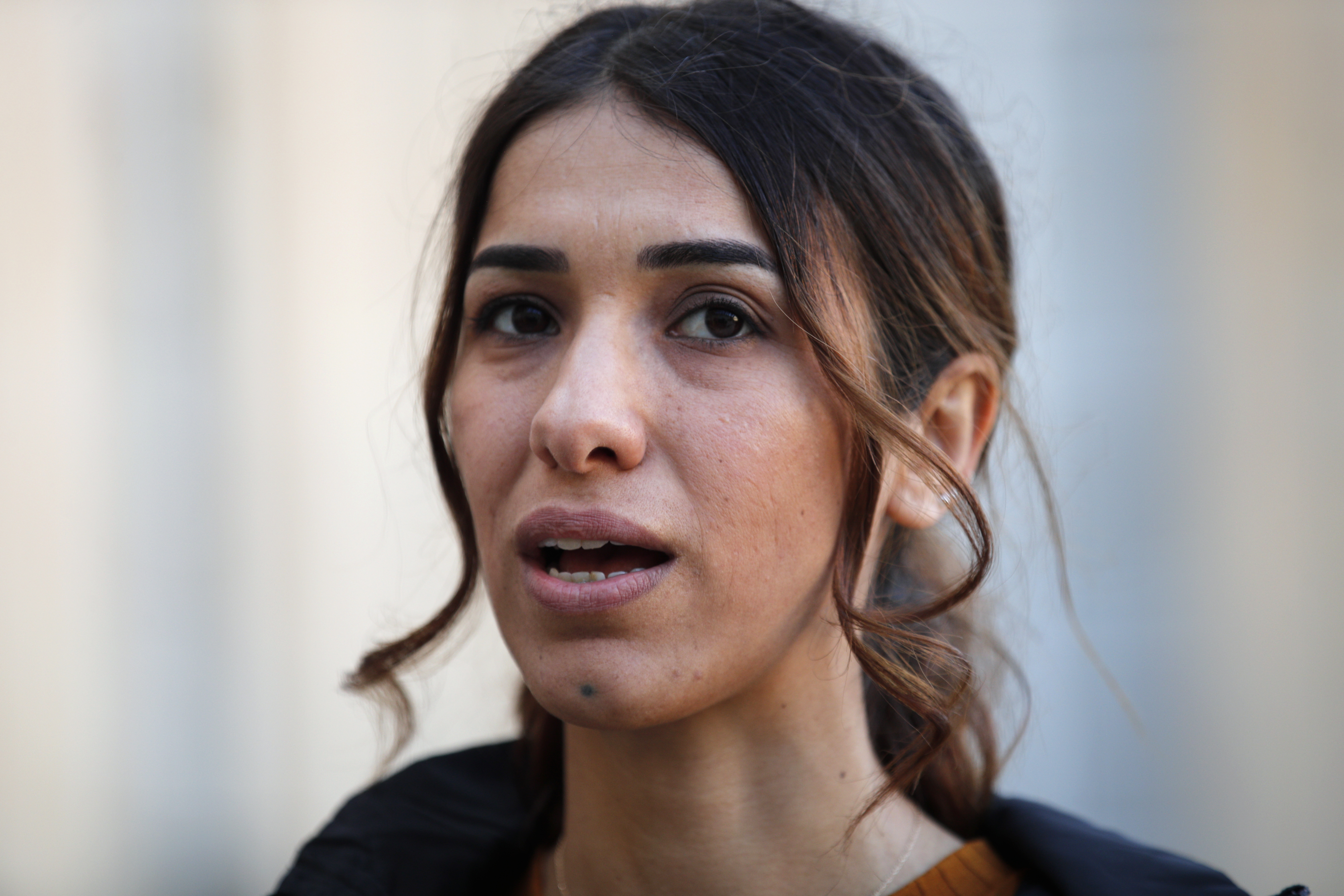 Nadia Murad, co-recipient of this year's Nobel Peace Prize. (Francois Mori / AP)
Nadia Murad, co-recipient of this year's Nobel Peace Prize. (Francois Mori / AP)
Listen to her interview with Scheer or read a transcript of their conversation below.
Robert Scheer: Hi, this is Robert Scheer with another edition of Scheer Intelligence, where the intelligence comes from my guests. In this case, it’s Alexandria Bombach, who won the Best Director in U.S. documentary at Sundance earlier this year. She has made an incredible movie on Nadia Murad, this heroic woman from the Yazidis ethnic group and religion based mostly in Northern Iraq, but also spread because of refugee status and everything else, throughout much of the world. And Nadia won the Nobel Prize along with another activist against sexual violence. She was a rape victim in the brutal ISIS attack on the Yazidi people. Welcome, and just tell me a little bit about your own background, and then how you came to this project, and why the project is so important.
Alexandria Bombach: Yeah, Nadia, I met her in July of 2016. The production company RYOT hired me to make a short film about her. I had followed the genocide as it was starting in August of 2014, and when Nadia gave her speech, I saw a video of her giving her testimony at the U.N. Security Council in December of 2015, but it wasn’t until July of 2016 that I actually met her. After that, I followed her for three months during her campaign.
At that time, they were going at a blinding speed just saying, “Yes,” to every interview, every testimony, every meeting as much as they possibly could. It was pretty immediate that the documentary was proposed, and they said, “Yes, let’s go.”
RS: As somebody who watched your movie, I think you bring great sensitivity. I mean, for once, we’re treating people who have suffered a great deal because of historical events as full human beings, as our own children, our own spouses, and what have you. This movie is relentless in reminding us of the humanity of what are otherwise seen as a hoard of undifferentiated people. So my hat’s off to you as a filmmaker. I think it’s incredible.
Part of me wants to criticize the apolitical tone of it, but I realize it’s sort of necessary, I think, to what you’re trying to say, that these are full functioning human beings, the equivalent of any other human being in the world, and even though they’re huddled masses at different points, and victims, they count as much as anyone you’ve ever met or cared about in your life.
AB: I think that this film follows up my previous work in such a big way, because my first film in Afghanistan was called “Frame by Frame,” and that was about Afghan photojournalists. And a big part of that film was wanting to explore ideas around perception, and how we come to know a place that is this unknown known in so many ways.
The Taliban had banned photography when they were in power, and then when they were ousted in 2001, fledgling free press was started. I went there in the Fall of 2012 and 2013 to follow these four Afghan photojournalists, and the film kind of gives the audience a new perspective of this place from a different lens than we’re used to seeing it from. I was really interested in the idea of storytelling and how we tell stories, so when RYOT came to me with the idea of making a short film about Nadia, it was something I wanted to do right away because I knew that she was telling her story over, and over, and over again, I wanted to know what effect that was having on the world, what effect that was having on her.
What I saw is that every time she told her story, it was taking little bits of her, and pieces of her. So many people wanted to take photos, and wanted meetings, and wanted testimonies, and throughout the film you kind of see her start to question what difference this is actually making.
As a storyteller, as a documentary filmmaker, I was really confronted with what is our responsibility to survivors? What is our responsibility to refugees, and to these stories of people, and how are we packaging stories of trauma? What questions are we asking? What are we not asking? That became kind of the central idea around the film.
RS: Yeah, and I think it’s a very powerful idea. It goes against another current in documentary filmmaking, and in fact, in journalism, which some have called disaster porn. We see these tragedies, and then you show people this starving kid with flies around his head moments before he dies. Yes, it’s awful, but you lose the sense of a human being, you have an object.
So let me ask you as a filmmaker, how did you develop this sensitivity? Is this something you got in film school, is this something you grew up, it’s part of your nature? You describe yourself as kind of a nomad living in different places, so how does one become like you?
AB: I don’t know. I was a middle child, that wasn’t an option. I ran away from home when I was 16 years old, and grew up with quite an abusive father, but I think ideas around trauma and not having a voice, and feeling helpless, and really didn’t realize it at first when I was first making my first films, but now I’m 20 years later really realizing that a big part of my childhood has affected how I see the world now, and what stories I’m very passionate and frustrated about, and want to tell. I think having a big part of the films be about perception, and it comes from a place where I just feel frustrated about our views of the world, and where they’re coming from.
RS: Well, tell me what you think about that, our views of the world and where they’re coming from.
AB: Well, I think very often, to bring it back to Nadia having to repeat her story, and a lot of things are over-simplified, especially when it comes to advocacy work, and trying to get people to care about something. A huge trend, of course, has been for 30 years now, to really separate good guy and bad guy in our storytelling in our news and in advocacy work.
A big part of this film, for me, is trying to create more gray between the black and white, and I think I’m trying to do that with all my films, where you see a politician interview Nadia, or have a meeting with Nadia and give her a gift. At that point, you’d been with Nadia so much that it’s kind of cringe worthy that that happens, but at the same time, you understand that this woman is trying to help, but her good intentions have kind of gone astray. I think a big part of this and a part of every film I’m making is trying to make people think more critically about things and not give the answers, but make them think and ask more questions.
RS: I think what you just said may be the most important thing that anyone can learn about the current human situation in the world, particularly aggressive mass media, celebrity stuff, and everything else. The story here is an incredibly simple one of a person coming from a religious ethnic background, which many people would find different. I mean, we should say something about these people. I always have trouble pronouncing Yazidis, but-
AB: Yeah, Yazidis.
RS: … but let’s not take … Yazidis. Everything’s in question. Are they an ethnic group? Are they a religious group? Here is a young woman who had a life, a rural life on a mountain and she valued. She valued her family, she valued her associations, she values her people, and in your film, you show her having these encounters.
The thing that seems to drive her most of all is to not have ego get in there. This is not about her, it’s about her people. It’s helping her people. She doesn’t want to be objectified. She doesn’t want to be made a movie. She ends up winning the Nobel Prize. She ends up affecting the lives of her people very dramatically, and you in a very deliberately non-political way humanize this situation, and give us a heroine who is, the most heroic thing about her, is she’s trying to channel her experiences, dark experiences as a victim, I mean, horrible brutalization by ISIS.
I’m not going to go through that, the people should know that story by now. But what emerges is, “Hey, how can I channel this to help people, help my own people?” Her people matter. Now, you just threw something out before about your own background, and I have to ask about that. I mean, you say you had an abusive experience, not quite what she had?
AB: Well of course not, yeah.
RS: Yeah, but I mean, really, you put yourself in this. I know you don’t, I know it’s not a movie about you, but I’m interested in how do we get more documentary filmmakers like you, so help me out here.
AB: I mean, I think a big part of this film … One big choice that I did make in the film was not to ask Nadia the questions that I saw journalists asking her, because I really wanted the audience to question why we’re asking those questions in the first place. A lot of it has to do with gawking at trauma.
What’s been really encouraging for me since the Sundance premier was so many festivals that I’ve been to, I’ve have had so many conversations with other filmmakers about our responsibility as storytellers, and what questions we’re asking, and also the immense pressure and weight we have as storytellers of how we’re distilling these stories of trauma and presenting them.
I’ve definitely seen films even this year that were sensationalizing issues, or really pointing out trauma in a way that I didn’t feel comfortable with. I’ve had good conversations with those filmmakers, and so I think there’s a lot of conversations coming out of this film that I’m really proud of, but I think it’s still something we’re grappling with as documentary filmmakers, let alone journalists and other storytellers.
RS: But clearly you had a rapport with this woman. Now, Nobel Prize winner will be remembered, and deservedly so. That rapport must have come in part out of your own experience. I don’t want to belabor this, but just tell me a little bit about who you are.
AB: I had an abusive dad and just literally ran away from home, lived with a lot of different friends-
RS: Where was home?
AB: I was growing up in Albuquerque in New Mexico and lived with friends and then really got a full time job at a restaurant while going to high school, and then really realized that no one was going to really take care of me but me. And so it was a real pull yourself up by the bootstraps moment. In a lot of ways my grades got way better. I was very responsible with my life, got into a college and was a very good student and it kind of made me into the person I am today. So I don’t think of those moments as something that harms me, but definitely something that built me into a really strong person.
RS: And is that where you learned filmmaking?
AB: I actually went to school for business because at that time I felt a business degree was going to be the most secure thing, especially after working in restaurants and-
RS: Can I ask you where you went to school?
AB: Fort Lewis College in Durango, Colorado, so just a small liberal arts school and thankfully it was a liberal arts school because my professor Dr. Yose and Dr. Bill Dodds they both encouraged me to make short videos instead of turning in papers and so it was such a small school and the professors were so kind to me that they just let me do whatever I wanted. So I ended up making a lot of videos and films while I was there because I had been filming since I was 13 years old. And then once I graduated it was 2008, so really in the midst of the recession. And so there wasn’t any job to be had anyway, and I felt like many people graduating that year, you could either do exactly what you wanted to do and what you love and make no money or you could pick up a horrible job and make no money, or not get a job at all. And so in a lot of ways I have the recession to be thankful for that really pushed me into questioning what I was doing and just doing what I love.
RS: I’m going to ask you about that because this is a terrific movie and terrific in a lot of ways in which I would not make a movie and I suspect many males would not make a movie and many A-type males would not make a movie. So this is really an argument why you need diversity in filmmaking and entertainment and media and so forth. And I think it’s also a lesson in why we need directors that look different than the white male majority and have a different sensibility. And clearly there’s a conversation going on between you and the subject of your film. And when I first watched you I was like, “What is this about and why isn’t there more about politics and why isn’t there more of this and whatever.” And then I realized I was asking all the wrong questions and that you in fact were able to develop this incredible rapport.
And one of the things that’s so powerful here, as you develop a rapport with somebody on first look, you would think comes from the other side of the world the totally different religious experience. I mean what could be further away from Albuquerque in New Mexico than this tribal ethnic existence, and yet there’s incredible rapport in this film. Why don’t you just tell us about the person that won the Nobel Prize that you encountered and how modern she seems. I mean we have an idea of “the other.” They come from a more primitive society, more primitive religion, more primitive economy…there’s nothing primitive about this woman. And here we have an incredibly idealistic person who’s taken her sorrow and used it as a teaching moment in the most self-sacrificing way. I mean, that is really the big achievement of this woman and you’re capturing it in this movie, is it not?
AB: Yes, and I will say that Nadia, something that really struck me about her, people like to throw around words like strong or resilient when it comes to survivors. But what I really like to point out is that, she’s just so incredibly gracious with everyone that she encounters and she’s also incredibly patient, of course, very frustrated and wanting for things to move much faster than they are for this Yazidi cause. But with everyone that I saw her encounter, she was just endlessly kind and gracious and that included people that would say the most bizarre things to her or ask her to do things like sit in chairs and take photos that as a filmmaker I wanted to push them away from her and yell at them. But she was just continuously, just so kind and open to anyone who wanted to help her.
And I think that included me. And people like to give me a lot of credit for this access that I got, but I don’t really think I deserve it because so much of why they said yes to the documentary is because of the survivor’s guilt that they had at that time and just trying to do as much as they possibly could. And then while I was there, every bit of access I got was because of Nadia’s grace and it wasn’t because I was any different than anyone else. She was just incredibly kind and patient with me. That being said, there was a period where she was really becoming disillusioned with what impact these stories and the interviews and all these things the media was really having and was feeling possibly exploited by a lot of these things and was questioning, I think, me in the same way. And rightfully so, I was questioning myself and what we were doing and what the point of it all was. And I think that’s what kind of why the film is made in the way it was because there was such a period where I was like I don’t know what the point of all this is. What does awareness really do? The UN is already aware of what’s happening there, they are the people who can make a difference. These heads of state, you’ve met with many presidents, they are the people that can make a difference and nothing’s happening, nothing’s moving. So it really made me question what the point of this whole thing was and so there was a period of time where it was more cold between us and that broke my heart. I didn’t want to be another person in her life taking something from her, but by the end I had just been around so long I think we were close again but it wasn’t always just this completely tight relationship and I don’t want to give any impressions that it was.
RS: Any honest journalist and you are a great journalist would have to admit that they’ve experienced that tension, that alienation, that question. Are they part of the problem? Are they there to help solve the problem? And it’s just there. And certainly in any war situation, refugee situation. We’re going to take a quick a break now and we’ll be right back.
We’re back with Alexandra Bombach talking about the incredible film and let’s talk about the winner of the Nobel Prize or a co-winner of the Nobel Prize Nadia Murad and tell us really what you want us to take away from this movie about this situation, and I want to give you just one little hook here. This stuff doesn’t have to happen. We don’t have to be messing up other people’s lives and by we, I mean the powerful in the world and the comfortable and all that.
But what your movie really is about is something that didn’t have to happen. So why don’t you sort of control what remains of our time and tell us what you think we should get out of this movie about this incredible human being.
AB: I think the big things that I’m asking people to take away or I’m hoping that people take away after seeing this film is really questioning how we’re hearing stories and where our ideas of places are coming from and what our involvement is. I think it would be a disservice to the film and also a disservice to the Yazidis to suggest that this film provides any answers for how to solve any problems. But I don’t think that was the film that needed to be made. I think that the big issue was what was so disturbing while being with Nadia was how everything was being handled in the interim of actually getting to action. And “On Her Shoulders,” we’re really asking questions about media, we’re asking questions about what politicians are doing, we’re asking questions about the UN and diplomats and heads of state, and in all of that, for an audience member who’s not in any of those roles I’m hoping they’re asking themselves, “What am I looking for? And what am I listening to when it comes to stories around the refugee crisis in particular?”
RS: Again, it’s not wallpaper and it’s not just stuff to fill up the cable shows or fill up the evening news. And the question is, do we really care? And really what you’re capturing here, I would say the unstated texts, is how dare we ignore the consequences of what’s going on in world politics? How dare we think of these people as in any way less worthy of our concern? That is really the challenge I think of your documentary.
AB: Yeah. I think it’s really … After making several films in Afghanistan and then working with Nadia, I think it’s really disturbing how different people have come up to me and had conversations like, “Oh, they’re used to it or this is what they’re used to and this is just how it is.” I’m completely disturbed by that logic. I think that’s what makes me continue to make films in this region, is that it’s just so misunderstood, and we’re also combating so many stories that embolden those bizarre ideas. I think it’s a very disturbing state of affairs, especially when it comes to our lack of empathy and sometimes even apathy towards these issues.
RS: Well, the dehumanization of “the other,” I just had an interview with a fellow who spent a five years in the Marines and a year in Afghanistan. I’ve done other interviews where people have come out of our recent endless wars. Iraq, Afghanistan, the two that you have covered, we are principally involved. We didn’t create everything.
We didn’t do everything, but my goodness, looking at your work with Afghanistan, there was a king once, who was fairly a good king, and somehow the great powers got involved, and we were going to show the Russians that they’re going to have their Vietnam, and Zbigniew Brzezinski said, “What difference does it make? You have a few outraged Muslims.” No. You have a few outraged Muslims and the Yazidi people get killed or raped. I’m not blaming the Muslim religion here. There’s just putting your stick in the human condition and stirring it around. A lot, a lot, a lot of innocent people get killed.
I’ve seen this as a journalist all my life really. I went to Vietnam as a journalist in the early ‘60s and I’ve seen this. You come back and everybody treats it as a wargame, unless there’s a draft, unless you have to go. Oh, so stuff happens. Oh, stuff happens to vulnerable people. It happens to people who can’t get a passport. They can’t get out of the way of the fire.
That’s what you are describing here. You’re describing … I love the fact that you’re not … She didn’t get a doctorate, and she didn’t have a fancy education. She is an ordinary village girl, who is subject to, what, these global forces really. I don’t want to speak for your film. I can’t, but taking away from gender, I think the movie Alex Gibney did win an Academy Award for Taxi to the Dark Side where you find one person from a village and caught up in these events. These people, the Yazidi people were basically, they were going their way, one way or another for a very long time until the world bothered to notice them in a really disruptive way.
AB: Well, I think that what was so unique about the Yazidis is they were such a vulnerable minority in that area of the world. This is actually the 73rd genocide that the Yazidis have been through in their history. It was a very calculated choice that ISIS made to attack this one community and systematically have a genocide against them because they were so vulnerable to that attack.
RS: What I think is incredible about you as a filmmaker is that you’ve thrown away most of the props. There’s a clarity and a simplicity, and I’m using it in a very flattering way here. There’s a human perspective, and so circling back to the original thing of what makes you, you. And also what makes Nadia, Nadia, there’s a common human refrain of concern, feeling, love. Didn’t you really click in with these young women in some very fundamental way as, what, dare I say a sister?
AB: Well, I think just even being around Nadia, she’s so incredibly impressive as a human being. Reading her book, The Last Girl, I think she’s just always been that way. She can be very feisty. She’s hilarious. She’s incredibly sharp. We would give her a Wi-Fi password that was all letters and numbers and she would remember it right away and a week later be able to recite it to someone who asks for it just off the top of her head. She is an absolute brilliant person to even be around, and I felt very humbled to be around her for so long. It was an incredible experience.
RS: You have introduced us to an incredible human being, but I think the power of your film is that she’s not the only incredible human being that’s hurt by these events in the world. Whether it’s a drone attack or an unnecessary invasion or a stupid dictator or a violent, vicious dictator. These people out there, “the other,” are capable, as much as any of us being brilliant and hilarious and moral. Is that not the big takeaway from … I don’t know. I don’t want to put it on you, but it would seem to me this is a manifesto of a film.
AB: Yeah. I hope that people are already there going into the film. I think I’m pretty sad when it’s even a thing anymore that people don’t think that people on the other side of the world are like us. I think it’s sad that we’re not even there yet. I hope that’s … If people are there, I hope that that’s the takeaway.
RS: After having seen what you’ve seen, do you think that most of us are there? Did we really care about these people even when … you point out in the film. Most of the time when she went around and she got invited to the UN and she got there, people really weren’t listening. They certainly weren’t acting, but do you ever any doubt that most of our—
AB: I definitely have doubt, but I think it’s my hope. Yeah, definitely. I think we’re definitely in a sad state of affairs, especially when it comes to the migration crisis or the refugee crisis that especially with any story around refugees, that there is a level of otherness and apathy towards those issues. It’s very depressing.
RS: Yeah. Well, let’s just say we’re recording this on a day when there’s the migrants from political violence and economic disaster and everything else trying to move from Central America up to the Mexican border, and they’re being treated by our own president as criminals. I don’t want to do too much editorializing here, but it’s important whoever is president to remember the people that we claim to care about or liberating, they’re not cannon fodder. You watch this movie, and it’s now screening everywhere. People have that opportunity on our shoulders. It’s really great to talk to you, Alexandria Bombach. I appreciate it. We urge people to go see the film, to be reminded that we all do matter and that history does matter.
Our engineers here at KCRW are Mario Diaz and Kat Yore. Our producers are Joshua Scheer and Isabel Carreon. This is Robert Scheer for another edition of Scheer Intelligence. See you next week. Bye.
Your support matters…
Independent journalism is under threat and overshadowed by heavily funded mainstream media.
You can help level the playing field. Become a member.
Your tax-deductible contribution keeps us digging beneath the headlines to give you thought-provoking, investigative reporting and analysis that unearths what's really happening- without compromise.
Give today to support our courageous, independent journalists.
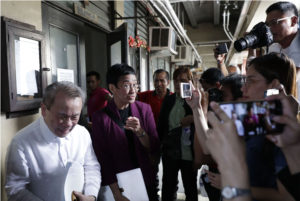
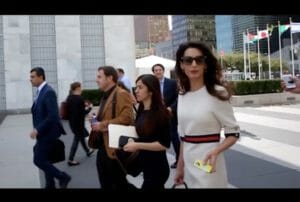
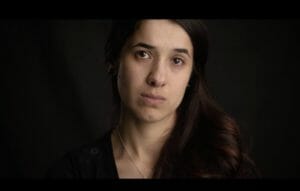
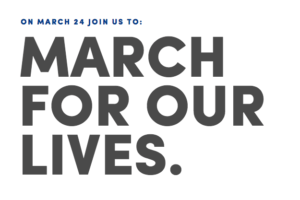
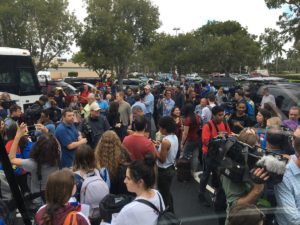
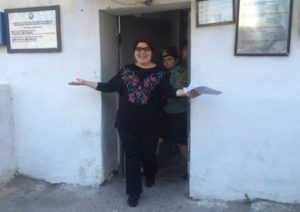
You need to be a supporter to comment.
There are currently no responses to this article.
Be the first to respond.